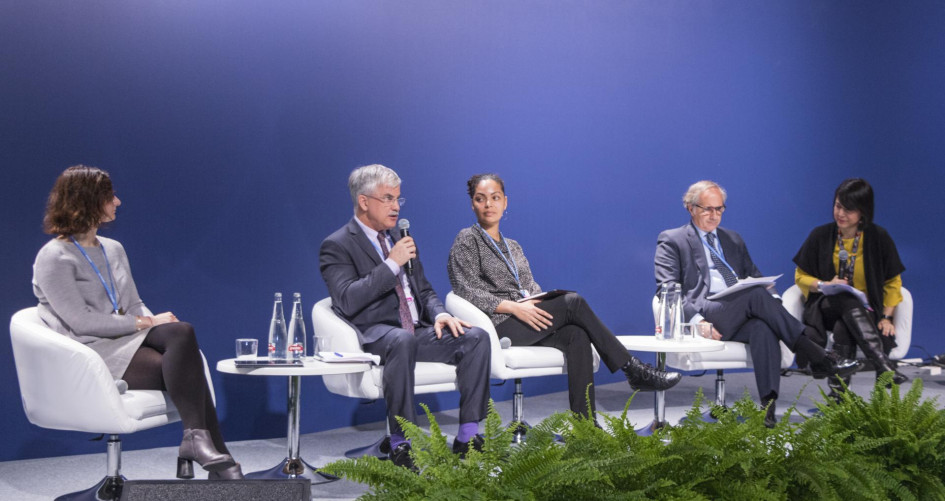UN Climate Change News, 20 January 2020 – Key publications presented at the UN Climate Change Conference COP25 in Madrid last month can be important resources in 2020 as countries strive to meet the temperature goals laid down in the Paris Agreement.
One publication, a yearbook, shines a light on existing climate action. The other lays down pathways to climate neutrality by mid-century. They are part of work by UN Climate Change with experts and civil society groups and are relevant for all stakeholders, including governments, regions, cities, business and investors.
In Madrid, High-Level Climate Champion Gonzalo Muñoz said that those engaged in the international response to climate change must work harder to connect with the “concrete needs” of people on the ground.
"Success in tackling the climate crisis is about collaboration, about interaction with different people that sometimes feel apart, but when they see a common goal they can achieve magic," he said.
“We are in the midst of a climate crisis,” said Martin Frick, Senior Director for Policy and Programme Coordination, UN Climate Change, who expressed cause for hope in an awakening that he sees happening among the investment community, “where finally environmental action is moving from corporate social responsibility to the core business; and, it has to be the core business.”
Yearbook and the Pathway Documents Are Comprehensive References
The Yearbook of Global Climate Action 2019 takes stock, highlighting climate action success stories and the need for conditions conducive to stepped up climate action, while the Climate Action Pathways suggest transformational actions and milestones towards neutrality in key areas, such as energy, industry, transport, human settlements, water, land use, and resilience to the inevitable effects of climate change. The documents were developed in a collaborative effort with the coalitions and initiatives of the Marrakech Partnership for Global Climate Action, under the leadership of the High-Level Champions.
“The bottom line is that active participation by all of us—governments, businesses, investors, regions and more—is needed if we are to overcome the climate emergency we currently face,” said UN Climate Change Executive Secretary Patricia Espinosa.
“The goals are set, the science is clear, tools are there, and needed actions are defined—let’s all work together in a holistic and integrated manner to make the required changes happen,” said the High-Level Champions.
Complementing the Yearbook and Pathways documents, there is another key knowledge product available for policymakers and the public, the Global Climate Action Portal (NAZCA), which records and recognizes climate action from a diverse range of stakeholders. Altogether, they show climate action and how climate action can be undertaken to keep the global temperature rise below 1.5 degrees Celsius and increase resilience to the impacts of climate change.
“Our choices matter. Climate-thoughtful choices add up to meaningful levels of ambition, especially when markets and policymakers recognize these actions and reflect them in products, policy and programmes,” said Ms. Espinosa.
The Yearbook makes clear that all actors – government and non-governmental, public and private – need to urgently step up the pace of action if the world is to achieve the Paris targets and avoid the worst effects of climate change. The Yearbook calls on governments to:
- Increase implementation across all thematic areas to realize multiple benefits;
- Create the conditions needed for non-Party action;
- Continue and strengthen the Global Climate Action agenda within the UNFCCC process post- 2020;
- Align finance flows with finance needs, and;
- Strengthen the completeness and robustness of the reporting of results from climate action.
The Climate Action Pathways chart the longer-term sectoral vision for a 1.5-degree climate-resilient world and sets out actions needed to achieve that future. The Pathways, which will be updated and added to over time, present a forward-looking concrete roadmap and actions from 2020 to 2050 for different actors towards meeting the goals of the Paris Agreement.
The full Yearbook can be accessed here.
The Pathways can be accessed here.
The Global Climate Action Portal (NAZCA) can be accessed here.
The Marrakech Partnership COP 25 programme can be accessed here.
More information on Global Climate Action can be accessed here.
See the webcast of the special event, titled “What We Are Doing and What We Need to Do” in Madrid.
